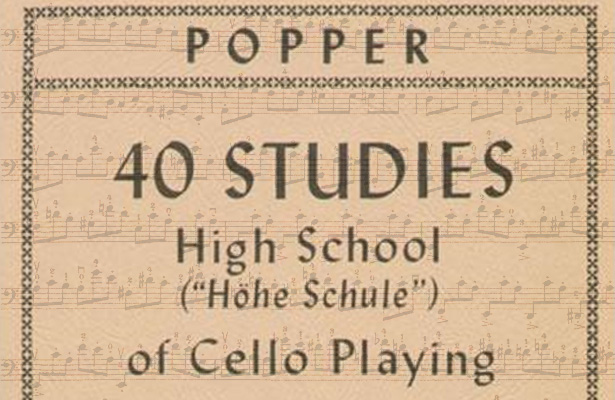Guest author Mihai Tetel, Associate Professor of Cello at The Hartt School of Music and Director of the ARIA International Summer Academy, has written a fantastic piece on helping cellists (as well as students more broadly) with practice strategies. In this article, he looks at how specific Popper studies can help cellists tackle standard cello repertoire. We hope you enjoy!
–Colin Cronin, Creative Director

I have often seen cello students struggle to master difficult passages from the standard repertoire, practicing these passages over an extended period of time yet experiencing no real improvement. Frustration inevitably sets in after countless attempts, a plateau is reached, and the students can end up discouraged with their work.
A possible solution which I strongly suggest to all students is specific work on one or more Popper études BEFORE they are assigned a challenging concerto, sonata, or piece to work on. If the technical demands of the assigned piece are tackled in advance, it is likely that work on the actual piece will be much more efficient and enjoyable.
In my experience over the years I have found that the majority of students I came in contact with generally try to avoid working on Popper études. I believe that these études are our friends; they can improve our ability to play any work in our repertoire. In addition, they are wonderful vehicles for refining and maintaining our technique and stamina. I have a saying: “A Popper a day keeps the troubles away!”.
Let’s look at some specific examples. The list below indicates a standard repertoire piece and the corresponding Popper étude(s) which can you prepare you,
| Repertoire | Popper Étude(s) | Notes |
|---|---|---|
| Haydn D Major Concerto | Études #18 and #38 | These exercises will make many difficult passages in the 1st and 3rd movements of the concerto feel more comfortable. |
| Bach Suite No. 4, Prelude | Étude #11 | This exercise will help you to master clean string crossings, often over one or two strings while maintaining constant bow pressure. |
| Locatelli Sonata, 1st and 3rd movements Popper Gavotte Tchaikovsky Rococo Variations, 1st and 2nd variations Schubert Arpeggione Sonata, 1st movement |
Étude #14 | This exercise will help you to master the up bow and down bow staccato strokes, as well as the coordination between the hands. |
| Dvorak Concerto
Ligeti Cello Sonata, 1st movement double stop passages |
Études #13, #9, and #17 | These exercises will help you master various double stop patterns and strengthen the left hand before approaching double stop passages in all three movements of the concerto. |
| Elgar Concerto, 2nd movement Popper Hungarian Rhapsody, fast 16th note passages on pages 2-3 and final page Tchaikovsky Rococo Variations, 7th variation |
Étude #27 | This exercise will help you with coordination and learning the flying spiccato. |
| Beethoven Sonata No. 4, last movement
Beethoven Sonata No. 5, 1st movement |
Étude #6 | This exercise will help you develop your ability to use a detache bow stroke in a loud dynamic, focusing on coordination between the hands and building endurance for the right arm. Using the same étude but with a lighter stroke would also be beneficial when working on the 3rd movement of the Haydn Divertimento. |
| Lalo Concerto, 1st movement | Étude #26 | This exercise will help you develop left hand agility and athleticism that would be very helpful in the fast passages near the end of the exposition and also near the end of the movement. |
| Bach Suite No. 6, Sarabande | Étude #34 | This exercise will help you with both pure intonation in double stops and also with bow control. |
| Hindemith Sonata for Solo Cello, 4th movement) | Étude #1 | This exercise will help you to master the bow stroke. |
These are just a few examples of specific Popper études that can be used as preliminary work prior to tackling the repertoire I mentioned. In addition, I also advocate ensuring that the student can first play scales and arpeggios in three and four octaves with various fingering and bowing patterns, as well as double stop scales in thirds, sixths, and octaves BEFORE they are assigned work on any Popper étude.
What examples from Popper (or other composers) have you used to help prepare you for the standard repertoire? I look forward to hearing about more pairings between difficult passages in the standard cello repertoire and specific études.














First of all Hitler was never a vegetarian, but even if he was it means Just because a bad person might eat a certain way does not mean it’s a bad way to Seeing those statements is simply deflection of the
i enjoy reading contents